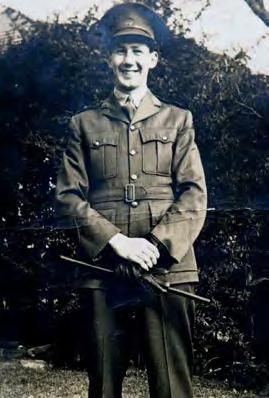
3 minute read
Vale Kokoda veteran Alan Moore
Alan Moore at a Remembrance Day service in 2017. He served on the Kokoda Track with the 39th Battalion. Photo: Eddie Jim. Alan Moore in his service days.

Advertisement
‘A great man’ Kokoda Track veteran dies at 100
He faced Japanese soldiers wielding samurai swords on the infamous Kokoda Track and later introduced canned baby food into Australia. Alan Moore, one of Australia’s last remaining veterans of the Kokoda Track campaign, has died aged 100. Mr Moore was the sole surviving officer of the 39th Battalion, which fought in Papua New Guinea to prevent Japanese forces from capturing Port Moresby during World War II. He died on the Mornington Peninsula in March. Norman Stockdale, former president of the 39th Australian Infantry Battalion Association, said Mr Moore was “one of the old blokes” when he joined the fighting as a 21-year-old lieutenant. “The average age of the 39th was less than 18,” he said. “They were all young men sent to do a bloody silly job with bodgy equipment, not enough food and wrong clothing.” Mr Stockdale said there were just seven members of the 39th Battalion left alive. On the 70th anniversary of the Kokoda battle, Mr Moore told The Age he believed the campaign had stopped mainland Australia from being invaded by Japan. “The conditions were terrible, it was mud and slush, we had incorrect uniforms, we were very poorly equipped, we had the leftovers of First World War weapons,” he said. In interviews with the UNSW Australians at War Film Archive, Mr Moore said he and his fellow troops were not prepared for the difficult conditions in Papua New Guinea, where he was struck down with malaria and dysentery. “It finished up we all packed tennis rackets and things like that in our bags, nothing was more remote from the truth,” he said. “We thought we would be going to some sort of tropical paradise where we would be doing parades and this that and the other, and that would be a great opportunity to fill in time until we were able to do something more constructive and get to a war.” In the same interview, Mr Moore said he never face a bayonet charge from the Japanese, instead coming up against someone wielding a samurai sword. “In later days down at Gona I did face one fellow coming at me waving his samurai sword above his head,” he said. “He was only 20 feet from me, coming straight at me with his samurai sword, but that was as far as he got.” Born in 1920, Mr Moore grew up in Camberwell. After the war ended, he married his wife Joan and had two daughters. He found a job working at Heinz, rising to become manager of the baby food division. He helped introduce canned baby food to Australia from America. “Initially [they were sold] in pharmacies, they didn’t sell very many,” he told the ABC in 2016. “We got into a few of the supermarkets. All of a sudden everyone in Australia was using Heinz canned baby foods.” Mr Moore was also involved in various community groups, including the Rotary Club of Frankston and, for 40 years, as a volunteer at Mount Eliza Op Shop. “He was a great man, very, very community-minded,” said fellow Rotarian Margot Kimpton, whose father also served in the 39th Battalion. “They are of a type of people, certainly you don’t give up.” Mr Moore often spoke to schoolchildren at the 1000 Steps walk, a memorial to the Kokoda Track, about his experiences during the war. “One of the things he said to all the kids right at the beginning was, ‘Do you know anyone who is 18? Think of them when I talk about these fellas,’ ” said Mr Stockdale. “Alan was very friendly, very approachable, very willing to talk about the Kokoda Track — not about what we did but what others did.”










